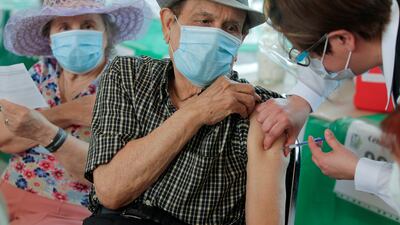Sales of AstraZeneca's coronavirus vaccine tripled in the second quarter to $894 million, but its application for approval in the US has again been delayed.
The Anglo-Swedish drug company will now file an application for approval in the next two to three months which, it hopes, will be approved "relatively quickly", chief executive Pacal Soriot told Bloomberg TV on Thursday.
With three vaccines already approved in the US, “there’s no emergency need any more”, he said. “Right now, our focus is to produce vaccines for the low- and- middle-income countries"
Mr Soirot's company also announced that it hopes to resolve its legal dispute with the EU over vaccine deliveries in the next few months, and that it would file for vaccine approval in the US in the first half of 2022.
The Oxford-made vaccine has been touted as a heavy weapon against the pandemic because it is cheaper to produce and easier to use than some rivals, making it ideal for poorer nations.
AstraZeneca and its Indian manufacturing partner, the Serum Institute, said they have supplied 1 billion doses to 170 countries so far.
Its focus on getting the whole world inoculated tallies with its pledge to not take a profit from the vaccine during the pandemic, setting it apart from rivals such as Pfizer, which are getting a considerable financial boost. The US company said this week it expects its vaccine to bring in $33.5 billion in revenue in the year.
AstraZeneca has refused to make a sales forecast on its Oxford University-engineered vaccine but reported $1.17bn in sales in the first six months of year. This puts it among the company's bestselling products, behind first-placed lung cancer drug Tagrisso on $2.54bn.
The vaccine sales were based on deliveries of about 319 million doses, giving an average price of about $3.7 per dose. Deliveries from the Serum Institute were not included.
Astra hoping for Alexion boost
Elsewhere, AstraZeneca is hoping for a boost from the recent purchase of rare medicines business Alexion, to add to its fast-growing cancer medicines unit and newer drugs, such as treatments for diabetes and heart conditions.
Including Alexion, it now expects total revenue to increase by a low-twenties percentage this year, and core earnings of $5.05 to $5.40 per share. The forecasts do not include sales from the vaccine.
Total revenue of $8.22bn for the three months to June, on a constant currency basis, beat analysts' consensus forecast of $7.58bn. Core earnings of 90 cents per share fell short of an estimated 92 cents.
If AstraZeneca's vaccine had been approved in the US, its financial results would have looked much rosier.
The firm was one of the first out of the traps on a coronavirus vaccine and had originally planned to file for approval in April. However, questions surrounding the company’s US trial results slowed it down as the likes of Pfizer and Moderna raced ahead.

